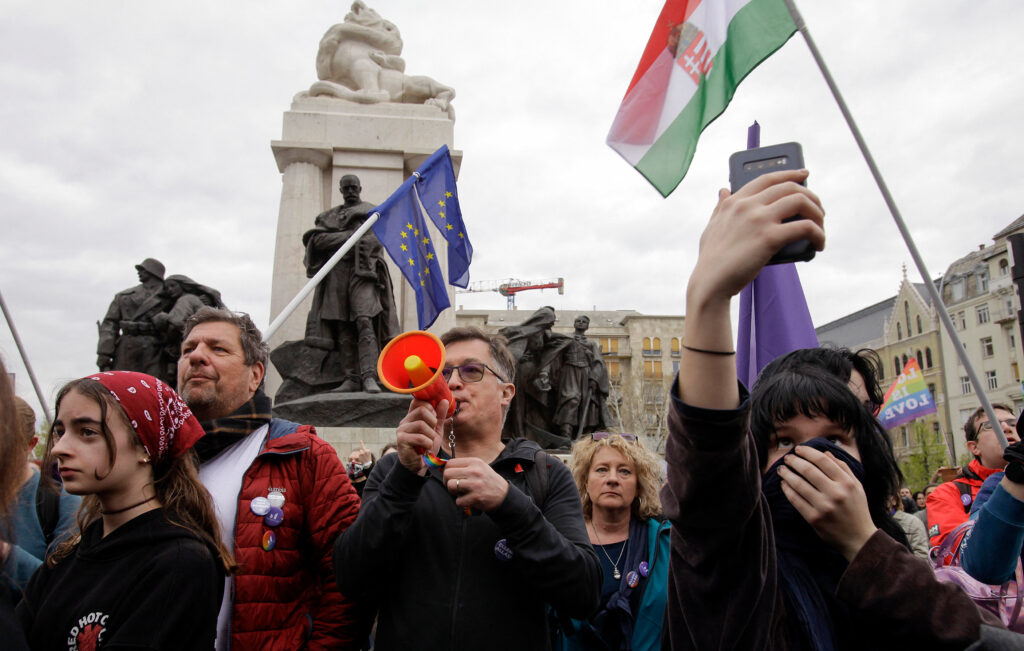Brussels – Another clampdown on civil rights in Viktor Orbán’s Hungary. The Parliament in Budapest has approved a controversial amendment to the Constitution that, in effect, puts a tombstone on freedom of association for members of the LGBTQ+ community (and those who demonstrate in their favour). The Magyar premier’s illiberal repression will now also be able to use facial recognition technologies, which critics challenge as a worrying authoritarian twist.
In yet another black day for Hungarian democracy, the National Assembly (the central European country’s single-chamber legislature) adopted this afternoon (April 14) by 140 votes to 21 a controversial amendment to the Basic Charter that severely restricts the rights and civil liberties of Magyar citizens who are part of the LGBTQ+ community.
The motion, strongly sought by Fidesz (the national-populist party of Viktor Orbán, an ally of Matteo Salvini and Marine Le Pen in Strasbourg and which holds the two-thirds majority in the House needed to reform the Constitution), amends the Assembly Legislation and formally codifies as a crime organising or participating in events that violate the highly contested Child Protection Law, starting with the Budapest Pride that had already been banned with an ad hoc measure not even a month ago.
The Child Protection Law, dating back to 2021, bans “the depiction and promotion” to minors under 18 of content branded by the ultraconservative executive as “homosexual propaganda.” The goal would be to safeguard the physical, mental, and moral development of minors, which thus gains precedence over other fundamental rights such as those of assembly, demonstration, and free expression. After today’s vote, the Constitution officially recognises only male and female sex, essentially closing the door to all other gender identities.

Alongside the ban comes the crackdown. The amendment voted today allows law enforcement agencies to use mass social surveillance technologies—especially those for facial recognition. Participants in banned rallies might thus be identified and fined up to 200,000 forints (about €487), as in the People’s Republic of China and Georgia, two countries whose governments do not shine in their commitment to protecting democracy.
In addition, MPs approved a crackdown on double nationality holders, granting the government the power to temporarily suspend Hungarian citizenship to anyone judged to be a “threat” to security (but only in cases where the second passport is from a state outside the European Economic Area). This is, again, an addendum to the controversial Foreign Agents Law, adopted to protect the country’s sovereignty from outside interference.
With that measure, which closely traces a similar law that has been in effect for more than a decade in Vladimir Putin Russia, Orbán is trying to knock out all entities that receive funding from third countries, in an attempt to further silence critical voices that still try to oppose his capture of the Magyar state. Today’s is the 15th amendment to the Constitution since the premier returned to power in 2010.
The reactions of the opposition parties and civil society associations underscore the risks associated with the authoritarian inroads of the “illiberal” Orban “state”. A participatory protest took place in the capital, with protesters attempting to block the entrance to the parliamentary parking lot to prevent MPs from taking part in the voting session, being physically removed by the security apparatus.

The Helsinki Committee, a human rights group, claims that Fidesz is using fear as a legislative weapon. “These laws represent a significant escalation in the government’s efforts to suppress dissent, weaken human rights protections, and consolidate its grip on power,” a statement reads. Together with Amnesty international and other organizations, it called on the European Commission to initiate a new infringement procedure against the country for violation of EU law.
Indeed, today, a delegation from the European Parliament’s Committee on Civil Liberties and Rights (LIBE) arrived in Budapest and will stay until Wednesday to monitor developments on the ground. The Strasbourg Chamber has long criticised the deterioration of democracy in the country, including the dismantling of the rule of law and the continued violation of fundamental freedoms and human rights. The latest move in this direction by the Magyar premier, in order of time, had been the announcement of Budapest’s imminent withdrawal from the International Criminal Court (ICC).
English version by the Translation Service of Withub







